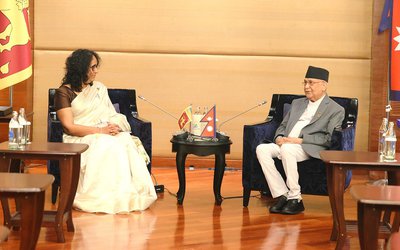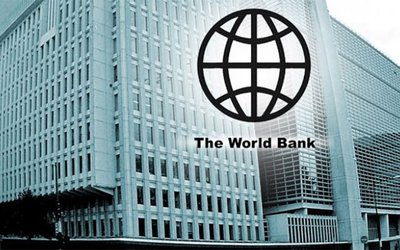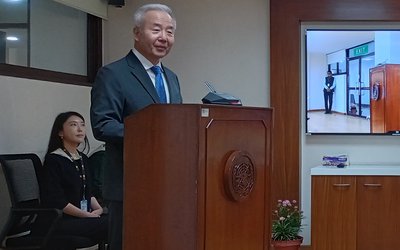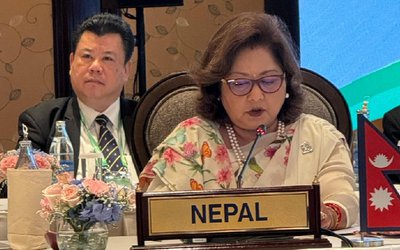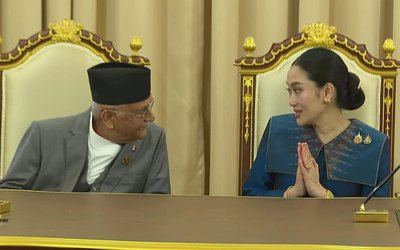People of Nepal are now without any doubt that Indian Prime Minister Modi visited Nepal soon after assumption of responsibility there to tell us in clear terms that he was genuinely interested in the well being of the people of this land of Lord Pashupatinath.His feelings and commitments have amply shown that India under the changed leadership would be generous and action oriented in dealing and doing business with its northern neighbor. In his speeches, he minced no words to tell how much he revered Pashupatinath and at the same time he also advised us how Nepal should lose no time in reaping benefit from tourism and water resources.Modi is indeed a religious man with lots of bright ideas to develop a nation. He very much deserved the warm welcome that was accorded to him by the people and government of Nepal.
Expectedly, Modi talked of cooperating with Nepal in making use of the vast water resources of this Himalayan country and has made it clear that everything taken away from here will be paid for. Management of water is a problem of Himalayan nature and magnitude in Nepal.It may sound paradoxical but in this land of perennial rivers people do not get drinking water even in cities like Kathmadu and peasants in rural Nepal depend on rains from the sky to grow crops. During monsoon, however, unregulated excess water (flood) causes irreparable damage to lives, property and crops as has happened this year, which started on August 2 when a massive landslide blocked Sunkoshi River at Mankha of Sindhupalchok district, turning the river into 190 meters deep and 2 kilometers long lake holding nearly 8 million cubic meters of water. The swollen river was said to have submerged 150 houses and the power house of one hydro project. This was followed by news of devastation caused by flooding in other parts of Nepal. The districts that have been severely affected include Surkhet, Bardiaya, Banke Dang and Kailali where hundreds of people have lost their lives, thousands have been rendered homeless, thousands of animal heads have been buried in debris and hundreds of hectares of arable land have been either swept away by the flood or turned into crop less sandy banks. Reports of losses of lives and property are coming also from other districts including some in the hilly areas. A total of 31 districts have been affected, the severest injury being inflicted on the people belonging to mid-western region, one of the two poorest areas of Nepal. When we want water for drinking and irrigation, it is not available but when we do not want much of it during monsoon, unchecked water gets into our houses and fields from the swollen rivers causing devastation.Indeed,some incidents of landslide and flooding taking place in recent times have shown some unusual signs and warrant immediate and concrete action in cooperation with friendly countries and international agencies. Management of water has to receive top priority and needs to be carried out in cooperation with the downstream country (India), which under the new leadership seems all set to genuinely cooperate with Nepal. The decision to implement, fixing a timeline, the long-stalled Pancheswor Multipurpose Project estimated to generate 6480 MW of power and irrigate around 1.6 million and 93000 hectares of land in India and Nepal, respectively, is believed to do away with the trust deficit between the two countries that has been impending project implementation. It may be noted that the two countries signed an agreement for the development of the project some 18 years ago during the signing of the Mahakali Treaty.Likewise,beginning of talks between the two countries on constructing the much delayed 41-km Amlekhgunj-Raxual petrol pipeline and closing of the field office of Indian Embassy in Biratnagar, as demanded by Nepal, soon after the historical visit point towards the creation of a suspicion-free environment where our two countries can work without compromising their vital interests. National interests of India and Nepal need not always be mutually exclusive in each and every collaborative endeavour and meaningful dialogue can always be taken resort to even in difficult cases because through negotiations convergence of divergent-looking ideas and interest is possible. In keeping with the size of the country, population and landmass, India is expected by every Nepali to be generous and magnanimous in dealing with Nepal.Indeed, relations/dealings between the two countries cannot be always reciprocal. Granting of a highly concessional loan in the amount of 1 billion dollar at 1 percent interest, as against 1.75 percent charged earlier on similar loans, and huge donation of Rs.400 million for the development of Pashupatinath area tempt us into believing that the emerging global political and economic power under Modi is going to be generous in dealing with us. If they also get some kind of benefit while helping us with an open heart and at no cost to us, can they be blamed? This is the question that we need to ask ourselves.
Time is ripe for us to initiate dialogue with India about our trade gap, transit problems and most of all management of our water resources to the benefit of both countries. It is a well known fact that the huge trade gap in favour of India cannot be corrected through merchandise exports and Nepal is left with no choice but to rely on exports of power and services.Pleasantly, Mr. Modi has talked of cooperation with Nepal in developing water and tourism sectors. As far as harnessing water resources of this country is concerned, capital from all over the world should be invited and India being the only buyer of our power, there is no harm in welcoming their capital received on competitive rates and conditions. Indian concern on this front should not be misconstrued as unnecessary intervention or encroachment because they are the sole buyer of our power to be generated and also the only recipient of water flowing from Nepal. It may also be remembered that our authorities here were quick in informing both China (upstream country) and India (downstream country) of the devastation caused by Sunkoshi and how the swollen river posed a threat to settlements downstream. Apprehending massive flood, Indians residing in the vicinity of Koshi Barrage had begun to move towards adjoining higher lands in Nepal to save their lives leaving everything behind back home. It was feared that the accumulated water would suddenly burst through the blockade, which could sweep away downstream settlements in both countries. Let us, therefore, not be allergic to their sensitivities and shy away from meeting to discuss bilateral, trilateral and multilateral investment requirement to develop Nepal’s huge power sector, power trade agreement and sharing of downstream benefits. Sharing of these benefits such as availability of drinking water, irrigation water for crops and flood control by India with Nepal is reportedly the bone of contention hindering implementation of different power projects. Taking full cognizance of prevailing global practices, benefit sharing should be decided on a case to case basis considering the extent and level of submergence of arable land, forest area and human settlement in the upstream country and benefits reaped by downstream country. Let us hope that the quarrel between political parties over formation and charring of High Level Political Committee and issues related to the preparation of the new constitution do not leave economic issues totally ignored as has been the case so far because the new leadership in India wants his country as well as its neighbours to prosper economically.

Dr. Tilak Rawal
Dr. Rawal is former governor of NRB.
- Six Months Of Deuba And Oli
- Jan 25, 2025
- Prachanda Outsmarted
- Jul 19, 2024
- Prachanda Outsmarts Again
- Apr 14, 2024
- Prachanda Completes One Year
- Jan 26, 2024
- Terrible Times To Continue
- Oct 12, 2023






